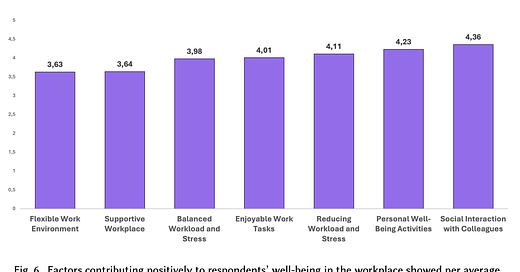RDEL #88: What factors influence the well-being of software engineers?
A cross-country study identifies that well-being in software engineering is shaped by trust, recognition, and connection.
Welcome back to Research-Driven Engineering Leadership. Each week, we pose an interesting topic in engineering leadership, and apply the latest research in the field to drive to an answer.
Sustained performance in engineering teams isn’t just about skills and velocity—it depends on the well-being of the people doing the work. When developers are burned out, disconnected, or overwhelmed, quality and focus suffer. But when engineers feel supported, trusted, and connected, they’re more likely to stay engaged, solve hard problems, and contribute over the long haul. This week we ask: What factors influence the well-being of software engineers?
The context
Software engineering is cognitively demanding and frequently subject to shifting priorities and tight deadlines. These dynamics—alongside rapid tech change and global team structures—place unique pressure on developers’ well-being.
Historically, workplace well-being research has focused on general populations, not software-specific environments. But developers face a mix of individual, team, and organizational factors that interact in complex ways. Personal health habits, social belonging, recognition, and tooling all play a role—but their relative weight has been unclear. Understanding how these dimensions intersect is essential for building healthy, sustainable engineering teams.
The research
To better understand what shapes well-being in software engineers, researchers conducted a mixed-method study combining 15 in-depth interviews with a cross-country survey of 76 developers. The interviews focused on engineers in Sweden, while the survey spanned 14 countries.
Key findings include:
Top stressors include workload and poor communication: The most common challenges were personal life stress (62%), high workload (53%), and tight deadlines (46%). Poor tooling, social isolation, and unstructured agile environments also contributed.
Personal practices are central: 71% of survey respondents regularly engage in physical health activities, and 51% in mental health activities. Interviews reinforced that developers often rely on exercise, sleep, and hobbies to manage stress.
Social connection matters deeply: Nearly all interviewees described positive social interactions—with colleagues or personal relationships—as essential to their well-being.
Support and recognition drive satisfaction: 91% of developers felt respected, but only 64% perceived strong professional growth support. Lack of recognition was a common driver of disengagement and turnover.
The application
Investing in well-being isn’t just about avoiding burnout—it’s a strategic lever for building a high-performing engineering culture. When developers feel supported, connected, and recognized, they’re more likely to stay engaged, collaborate effectively, and deliver high-quality work. This study makes clear: well-being is foundational to sustained productivity.
To build a more resilient and effective team, engineering leaders can:
Integrate well-being into team rituals: use retros, 1:1s, or DevEx surveys to surface stressors and adjust workloads before burnout hits.
Strengthen social connection: encourage lightweight team-building, mentorship, and unstructured time to foster trust and reduce isolation.
Prioritize meaningful recognition: acknowledge contributions—big and small—publicly and often. Developers who feel seen are more likely to stay and perform.
Empower through flexibility and trust: give teams autonomy in how they structure their time and tasks. Developers thrive when they’re trusted to manage their work.
By embedding well-being into team norms, leaders don’t just improve morale—they create the conditions for focus, innovation, and sustained delivery.
—
Have a great week, and Happy Research Tuesday!
Lizzie





